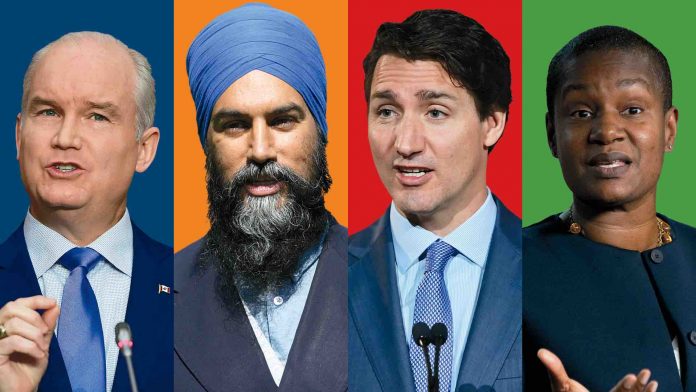The federal election race remains tight, a new poll suggests, but the Conservatives’ momentum appears to be building as the Liberals and NDP campaigns are stalling.
The Ipsos poll conducted exclusively for Global News found that 35 per cent of decided voters would vote for the Tories, up three points from last week. The Liberals would earn 32 per cent of the vote, up one point, while the NDP went down two points to receive 21 per cent.
“I think what we’re seeing here is a bit of a consolidation of the vote on the right behind the Conservatives,” said Darrell Bricker, CEO of Ipsos Public Affairs.
“(People are) starting to believe that the Conservatives actually might be able to beat the Liberal Party this time.”
The latest poll marks the first time since the start of the campaign that the Liberals have seen their potential vote share go up, as the party battles a wave of disillusionment with leader Justin Trudeau and the timing of his election call.
Conversely, the NDP has been on the rise throughout the campaign until now, where the party’s support appears to have hit a wall.
“So far, it looks like the progressive vote remains split,” said Bricker, who suggested the Liberals may be bringing back some past voters who have been toying with jumping ship to the NDP.
“The Liberal Party is trying to make a case to lapsed Liberal voters … to say, ‘Look, if you want to stop the Conservatives — which we’re going to portray as very scary and bad for the future of the country — you really can’t stick with the NDP. You have to move over back to the Liberal Party,’” he said.
“There seems to be a little bit of a wobble right now on the NDP side. Maybe (the Liberals have had) a little bit of an effect, but we’ll have to see.”
Further adding to the progressive split is an uneasiness among Liberal and NDP voters, less than half of whom said they are certain of their choice. A slight majority of Conservative voters — 53 per cent — said they are confident about their vote.
The poll, which surveyed 1,500 Canadians online this past weekend, found the Green Party would earn just two per cent of the vote, down two points from last week and tied with the People’s Party of Canada. The Bloc Quebecois is sitting firm at 34 per cent support in Quebec, the poll suggests, or seven per cent nationally.
Twelve per cent of Canadians surveyed remain undecided about who to vote for, while four per cent said they would not vote at all.
The Bloc appears to have chipped away at the Liberals’ support in Quebec and is now leading by a hair in the province, with 34 per cent compared to 33 per cent for the Liberals in a statistical tie. The Conservatives have improved their standing there with 21 per cent support.
Only Atlantic Canada is supporting the Liberals more than any other party, with 44 per cent of those surveyed saying they’ll vote for the incumbents.
In Ontario, the Conservatives are statistically tied with the Liberals at 37 and 35 per cent, respectively, while the Tories have commanding leads in the Prairie provinces.
The NDP is leading the way in British Columbia with 35 per cent support, followed by the Conservatives with 30 per cent and the Liberals with 29 per cent, creating a competitive three-way race in the battleground province.
The race has also tightened up considerably among demographic lines, according to the poll. While Conservatives are leading among both men and women over the Liberals, the Tories are only ahead by three points with women and two points with male voters.
It’s even closer within the various age groups, with the Conservatives and Liberals statistically tied among middle-aged and elderly voters and the NDP and Tories in a dead heat with those aged 18 to 34.
“Some of the things that we used to see in the past are not really happening in this election,” said Bricker, who noted there’s usually a “fairly big” gender gap between the parties.
“This is a very strange election in many ways. And this is one of those things that really stands out as being different from what we’ve seen before.”
Among the party leaders, the NDP’s Jagmeet Singh remains the most well-liked among those surveyed, with 45 per cent supporting him. Trudeau was seen the most unfavourable, with 56 per cent saying so.
Despite only 33 per cent saying they view Erin O’Toole favourably, the Conservative leader saw the biggest decline among those who don’t know enough about him, dropping six points to 18 per cent. It represents a strong showing for a novice party leader who has only held the job for a year — all during a pandemic that has limited his outreach.
“The clear winner in terms of building a new following in Canadian politics around leadership in this election campaign so far has been Erin O’Toole,” Bricker said.
































